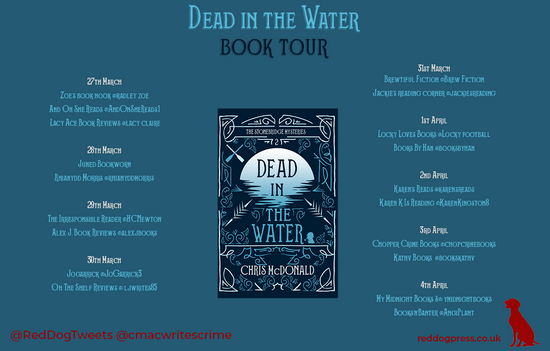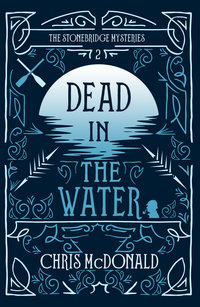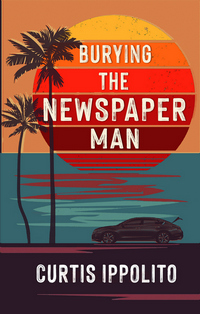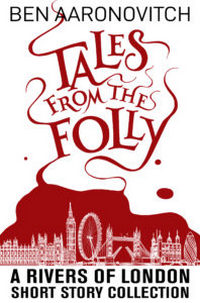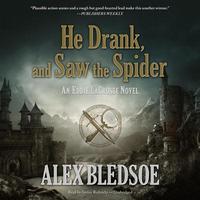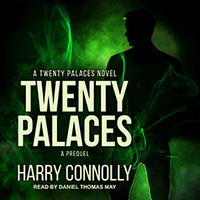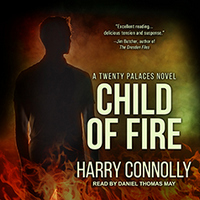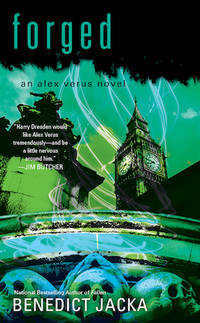 |
Drop the Mikesby Duncan MacMaster Paperback, 243 pg. Read: March 29-30, 2021 |

“Mathilda, my wife, says that archaeology runs in your family.”
“My parents are archaeologists,” said Baxter with a nod. “They teach, and every summer they go to digs in Europe or the Middle East.”
“They’re pretty respected,” said West, “what do they think about their son the cartoonist, turned detective?”
“I don’t think they ever fully understood what I do,”said Baxter. “In fact, most days, I don’t fully understand what I do.”
A Little Bit about Kirby Baxter
Before I get into this book, let me give a quick run-down of the series. Kirby Baxter is a comic book artist/writer. A few years ago, he came into a lot of money and took some time for himself in Europe. Kirby has the kind of eye for observation and powers of deduction comparable to Shawn Spencer or Adrian Monk (you could include several incarnations of Holmes, etc., too—but Shawn and Monk are closer in tone to this series). While in Europe, he found himself in situations where he could use those gifts to help solve some crimes—this got him a bodyguard, valet, assistant, or whatever, named Gustav, and both of them were made official Interpol consultants.
His talent(?) for being in the general vicinity of crimes continued once he got back to the States and he’s ended up helping the police in various cities with murders and other crimes. He’s frequently helped in this by the aforementioned Gustav; his girlfriend, Molly; her gossip-blogger cousin, Shelly; and his friend and colorist, Mitch Mandelbaum.
What’s Drop the Mikes About?
As a thanks for a bit of deduction that saved a New York Hotel a lot of money and even more bad publicity, Kirby and his friends (Molly Mitch, Gustav and Gustav’s girlfriend, Miriam) were given the opportunity to spend two weeks in some villas at a resort that’s about to open on a Caribbean island. Sounds like a fun little getaway, right?
Kirby Baxter doesn’t get those anymore. But we’ll get to that in a minute.
At the same time they arrive on the island, so do many other people—these people are largely young, with a lot of money, and/or are social media “influencers.” They’re on the island of a big luxury music festival to help promote a new product from a company called HÿpStar. Except the festival didn’t have any musicians (their checks bounced), or food (same), or decent places for the attendees to stay (you probably have guessed why by now).*
* If you’re thinking, this sounds a lot like Fyre Festival, give yourself a pat on the back.
Before the situation can totally deteriorate with the festival, the right-hand man to the organizer is found murdered. So you have thousands of disgruntled festival-goers, all with a reason to be angry with the victim, with almost every one of them trying to get off the island as fast as possible. It’s a bit much for the small island police force—thankfully, there’s a renowned detective in the neighborhood.
So Kirby and his friends have their vacation cut short.
The Hÿp Festival
I think I was largely offline for whatever reason about the time the whole Fyre Festival thing happened, and I missed most of the early hubbub, and then when I started to become aware of it, I didn’t exert a whole lot of effort into it. I’ve picked up a thing or two in the years since then, but that’s about it. So while I’d like to say something about the way that MacMaster satirizes The Fyre Festival, but I can’t. Seems outlandish and crooked enough.
But I can say that some of the more outlandish characters are hilariously drawn—like the influencer who cannot help speaking in text-speak acronyms, like “Double-you-tee-eff” or “Ess-em-aitch.” I appreciated MacMaster not using the acronyms themselves but going the extra mile and spelling out the letters, it added just enough to make her ridiculously charming. Carting around a ceramic Buddha statue and calling it her “Good luck Gandhi” was borderline-too-much, but I found it amusing every time it came up, so I’m not going to criticize it.
Too Much Going On
The two earlier Kirby Baxter books had a lot going on—several characters, each with their own arcs intertwined with the others—and that’s repeated here as expected. But this time it felt like there were too many other characters and their arcs running around—it wasn’t confusing or anything (we’ve all seen that before, this isn’t one for that list), but to do an adequate job for each of those, MacMaster had to use Kirby less.
But also, his friends—his self-labeled Scooby Gang—are running around doing their own thing while he’s looking into the murder (some are acting independently to help, others are working along with him), and that ends up taking time away from Kirby getting to shine. Sure, (to refer to that other Scooby Gang) we all know Fred, Velma, and Daphne have to look for clues on their own—either paired up or on their own—but the viewers came to see Scooby and Shaggy (possibly Scrappy-Do, too) and the more time we spend with Fred and his ascot doing things the less we see Scooby and Shaggy and the less entertaining the episode is. The same applies here. Molly’s great doing her own thing. Ditto for Miriam—and even Mitch is pretty darn amusing and got to do things we don’t normally associate with him. I’m all in favor of it, but Kirby was off-screen too much of this book.
A Small Gift for Long-Time MacMaster Fans
Readers of MacMaster’s other series, the Jake Mooney books, might recognize this particular part of the Caribbean, as it was the setting for Hack (and if you don’t recognize it, that’s okay, a couple of characters will make sure you get the connection).
It’s one of those things that won’t bother you if you don’t get the references as you read, but if you do, you’ll appreciate the ties between the two.
Now, what are the odds we can get Jake and Kirby working the same mystery from different angles?
Baxter had long thought that the adventures that afflicted his life the last few years had immunized him from ever feeling shocked, or surprised. It was one of the very rare instances where he was very, very wrong.
So, what did I think about Drop the Mikes?
Drop the Mikes is 243 pages of pure enjoyment. It’s that simple. You have Kirby being geeky and almost supernaturally-clever self. You get Molly and Gustav doing their usual thing. Mitch gets to be repulsive yet endearing—and even a little heroic, and we get to meet Miranda, the librarian who could be an action star if she really wanted to.
Throw in a handful or two of whacky characters, the disaster of the Hÿp Festival, a couple of murders, financial hijinks, another couple of crimes that really have nothing to do with the Festival outside of location—and you just can’t stop turning the pages to see what MacMaster has left up his sleeve.
These books are like ice cream or pizza—even if the one you’re eating isn’t as good as others you’ve had, they’re still ice cream or pizza, and you’d rather be eating them than just about anything else. I strongly recommend this book—and the rest in the series, too—well, anything with Duncan MacMaster’s name on it. I can’t think of another book this year that I’ve had as much fun reading as this one. And I bet there won’t be many in the 7+ months yet to come.

![]()


